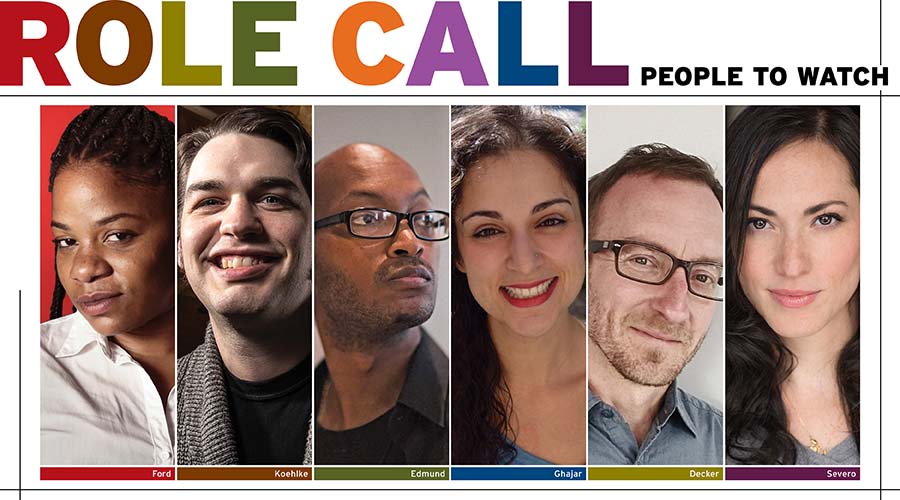Jasmine Ford
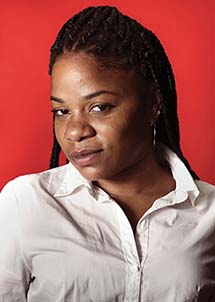
Profession: Front desk administrator at the Public Theater
Hometown: Brooklyn
Current home: The Bronx
Known for: In June, Ford will have been at New York City’s Public Theater for two decades. In her current role she’s known as the face of the theatre, providing customer service and making sure guests have the best experience possible.
What’s next: She’s training two new staff members on how to manage the information and front desks.
What makes her special: “Jasmine Ford embodies the ideals the Public Theater strives to achieve every day,” says Ford’s supervisor, Ruth Sternberg, the Public’s production executive. “As the face and voice of the Public, she has welcomed countless artists, patrons, partners, and community members into our space with radical kindness and capability. Jasmine is a comforting, dependable fixture of our staff; she possesses that unique human ability to empathize with anyone who walks through our doors, and does so while maintaining a constant professionalism and poise.”
Background at the front: It was in 1998 that Ford started working as an usher at the Delacorte Theater for the Shakespeare in the Park stagings of Cymbeline and The Skin of Our Teeth. As front desk administrator, she says she strives “to engage and welcome audiences from all diverse segments of our community,” as well as “provide opportunities for those who create the theatrical experience to express their art and to receive the appreciation their efforts deserve.” She adds, “Before I came to the Public Theater, I had no theatre background. But after working here for 20 years, I think I’ve earned the right to say I have a theatre background.”
Nick Koehlke
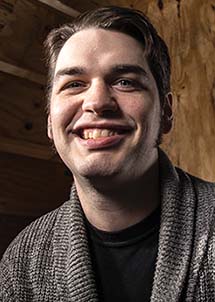
Profession: Technical director
Hometown: Fairfield, Ohio
Current home: Cincinnati
Known for: Koehlke was a studying technical production at the University of Cincinnati’s College-Conservatory of Music when its shop was contracted to build sets for the 2011-12 season at Know Theatre of Cincinnati, and he came on full-time immediately upon graduating. Since then he’s built all 36 sets for the Know’s mainstage productions. In addition Koehlke is also in charge of Know Thea-tre’s craft beer selection.
What’s next: He’ll tech-direct the 15th annual Cincinnati Fringe Festival at the end of May, meaning that he and his team will convert everything from art school studios to church basements into bare-bones theatres, complete with seating, drapes, light plots, and audio systems the Fringe crew has “scrounged and cobbled together over the last 15 years.”
What makes him special: Tamara Winters, the Know’s associate artistic director, calls Koehlke “a bit of a wunderkind…I don’t think I’ve ever worked with anyone better at making magic on a shoestring.” How thin is that string? She says that Koehlke “takes a lot of pride in keeping his average budget between $700 and $900. He’s a legit genius.”
See and feel: At Know Theatre, Koehlke has rigged up blood cannons and made rain, snow, and feathers fall, all in a 99-seat black box. He wouldn’t have it any other way: “The action is always right there for our patrons to see and feel with our casts.” He relishes “watching the spit fly from a passionate vocalist’s mouth or seeing the sweat bead up on a brow that’s been straining under thousands of watts of light to put on a show just for you.”
Reginald Edmund
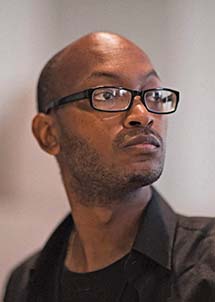
Profession: Playwright/producer/activist
Hometown: Houston
Current home: Chicago and London
Known for: Edmund, a resident playwright at Chicago Dramatists and London’s Tamasha Theatre, is writing a nine-play cycle, The City of the Bayou Collection. Edmund is also the managing curating producer of Black Lives, Black Words International Project, which aims to explore the black diaspora experience in some of the world’s largest multicultural cities.
What’s next: Edmund is prepping for this summer’s three-day I Am Festival, which will showcase black female writers from the U.S., Canada, and the U.K. and commission black writers from around the world to memorialize victims of police brutality. Closing the fest will be a theatrical interpretation of Sandra Bland’s arrest, created by Mojisola Abejola, and performed by 100 women of color and immigrant descent.
What makes him special: Sean Daniels, artistic director of Merrimack Repertory Theatre, who serves on the Black Lives, Black Words advisory board, calls Edmund “one of the most exciting playwrights and truly unstoppable community organizers out there…Also, he’s a bit of a rascal, and that’s truly part of his charm.”
Closer to gods: Edmund is most excited by art that rallies communities together. “I dream about a theatre that activates and heals, and is equitable to those it serves,” he says. “Sometimes people forget that this craft we do started off as a means for us to get closer to our ancestors and our gods. So I believe every work we put forward should be empowering to our spirits.”
Sanaz Ghajar
Profession: Director, writer
Hometown: San Francisco
Current home: New York City
Known for: As artistic director of Built for Collapse, Ghajar has directed 13 new plays, adaptations of classics, and devised shows, including Nuclear Love Affair, which was performed in NYC, Prague, Rome, and Krakow. She recently helmed the multimedia play Red Wednesday at Mabou Mines as part of the SUITE/Space program, and has developed work with New York Theatre Workshop and others.
What’s next: Danger Signals, a collaboration between Built for Collapse, British playwright Nina Segal, and pop musician Jen Goma, runs at NYC’s New Ohio Theatre April 27-May 19. She’s also developing Virtuous People, a post-punk science fantasy work about the future effects of global climate change.
What makes her special: Ghajar assisted Rachel Chavkin on Hadestown at NYTW, and Chavkin raves, “Sanaz’s work with her company, Built for Collapse, is intellectual and emotional and athletic as hell. I’ve been watching with excitement for years as she’s tackled subjects from atomic warfare to the Iranian revolution, and working ever more personally.”
Heart and brain: “I rely on impulse, intuition, and collaboration,” says Ghajar of her approach. “I give actors and designers the latitude to contribute and to invent the shows together with me, often drawing together disparate cultural references and unconventional media.” She brings a lot to it herself, calling her work “always sexual, often psychedelic, and inevitably traumatic. I had heart surgery at a young age, and then about four years ago, I got into a car accident and experienced a traumatic brain injury. I connect those life experiences to the way that I approach a devising process.”
Tristan Decker
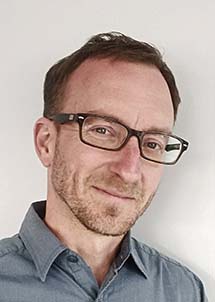
Profession: Designer, professor, technical director
Hometown: Murphy, Texas
Current home: Fort Worth, Texas
Known for: He’s technical director for Texas Christian University’s department of theatre and has worked as the set designer at Fort Worth’s Trinity Shakespeare Festival for 10 years. For his work he’s garnered a number of Dallas/Fort Worth Theatre Critics Forum Awards.
What’s next: He’ll serve as T.D. for Theatre TCU’s Bat Boy: The Musical, and lighting designer for Trinity Shakespeare Festival’s Twelfth Night and Greater Tuna at Oklahoma City Repertory.
What makes him special: Donald Jordan, the founding artistic director of Oklahoma’s CityRep, has known Decker professionally for 25 years. From the first, Jordan has been impressed by Decker’s “superior work ethic, keen intelligence, dedication, artistic sensibility, and collaborative spirit…I knew then that this was a young man who would make a positive impact on our art and the world.” Jordan’s been singing his colleague’s praises ever since. “His knowledge of his rapidly evolving profession is always cutting edge, his understanding of the script and the goals of the production is remarkable, and the same ability and character that he has displayed since we first collaborated are still the foundation of his exceptional creativity.”
Teachable moments: “‘This is probably too complicated to do’ is a call to arms for me,” Decker says. “I thrive on the opportunity to experiment and learn new techniques.” It’s a spirit he tries to pass on to the next generation. “It’s critical that our students see the good and bad, the successes and failures, and the iterations that grow from those experiences. Some of our best work can come from ‘playing’ around.”
Vanessa Severo
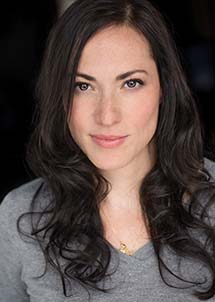
Profession: Actor/writer
Hometown: Portalegre, Brazil (but raised mostly in Frankfurt, Germany)
Current home: Kansas City, Mo.
Known for: At Kansas City Rep, Severo played Cassandra in Vanya, Sonia, Masha, and Spike; at Unicorn Theatre, Vanda in Venus in Fur; at KC Actors Theatre, Rosencrantz in Rosencrantz and Guildenstern Are Dead.
What’s next: She’ll bring back her solo show Frida…a Self Portrait, about Mexican artist Frida Kahlo, to Kansas City Rep in summer 2019, as the culmination of her TCG Fox Fellowship.
What makes her special: Cynthia Levin, Unicorn’s artistic director, has worked with Severo for a dozen years, and takes special pleasure in her versatility. “There is no limit to what she is capable of. She is equally at ease with broad comedy as she is with heartfelt, dramatic roles.” Joanie Schultz, artistic director of Texas’s WaterTower, who’ll direct her in Frida, calls Severo “one of the most magnetic performers I’ve ever encountered…She embodies depth, authenticity, and attention that somehow simultaneously manifests both as a smooth lightness and a dark seriousness.”
What if: Severo says she was hooked from her first theatrical experience, in Germany at age 12. “I knew immediately it was what I wanted to do for the rest of my life.” What keeps her going, she says, is “quite simple: stamina and the question of ‘What if…?’ My favorite kind of work is the kind that initially terrifies me. You can’t do your job and be afraid. When I knock down that initial fear, I know the real growth and artistry of the work is in development.”

